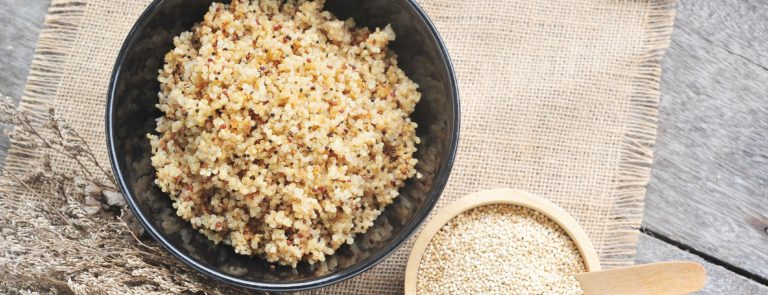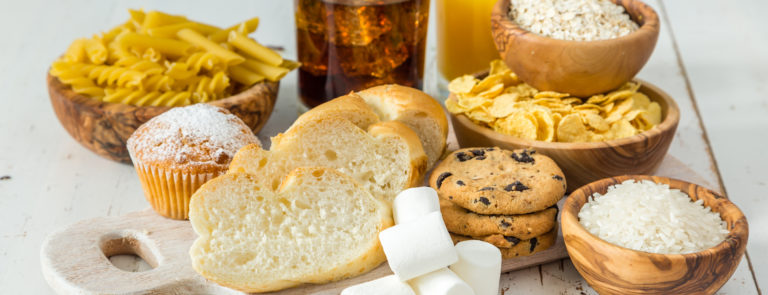10% off £35
Code:SAVE
Health benefits of quinoa

Discover the many health benefits of protein-packed and gluten-free quinoa.
Quinoa is an edible grain-like seed which comes from a plant which has been grown for thousands of years around the Andes mountains in South America.
In the UK, quinoa is known as one of the standout health food trends of the 21st century.
So, is quinoa good for you? Yes - quinoa known for being super-healthy and prized by health experts for its nutrient profile.
But is quinoa keto? Is quinoa low carb? What exactly are quinoa’s credentials? Read on to find out more.
Quinoa health benefits
Quinoa is a rich source of nutrients, including the following:1- Calcium – a mineral essential for healthy bones, blood and muscle tissue
- Magnesium – vital mineral which helps turn the food we eat into energy
- Manganese – a trace mineral which helps make and activate enzymes in the body, which aid chemical reactions such as breaking down food
- Protein – essential for tissue and muscle growth and repair
- Fibre – helps keep you regular and essential for good digestive health
- Iron – a mineral important in making red blood cells, which carry oxygen around the body
Quinoa calories
When it comes to quinoa, calories aren’t something you should worry about. A 125g serving of boiled quinoa has just 139 calories.2 Of course, adding butter, oil, cheese or other accompaniments will ramp up the calories of your quinoa dish. If you’re watching your weight, try our Warm Green Vegetable Quinoa saladQuinoa protein
With quinoa, protein content is one of its biggest claims to fame. Quinoa benefits from a relatively high protein content for a seed or grain at around 5g protein per 125g serving.3 What’s more, the protein in quinoa is what’s known as a ‘complete’ protein, meaning that it contains the full range of essential amino acids needed to build healthy muscle, skin and other bodily tissues. Complete proteins are rare in plant foods, which is part of the reason why quinoa is known as a superfood.Is quinoa low carb?
Quinoa is relatively high in carbohydrates, with around 23g of carbohydrates per 125g serving of cooked quinoa. Therefore, it’s safe to say it’s not a low-carb food.4 However, quinoa carbs are the healthiest type around. Quinoa is a source of complex carbohydrates. This means the carbs in quinoa are digested more slowly by the body and aren’t converted into glucose as quickly as the refined, simple carbs in something like white pasta. Quinoa provides a rich source of energy for a low calorie count. Quinoa’s complex carbs also provide your body with longer-lasting energy and helps avoid blood sugar spikes, which can damage your body over time.5 If you’re wondering - quinoa technically isn’t part of a strict ketogenic (or ‘keto’) diet due to the carbohydrate content.Is quinoa gluten free?
Quinoa doesn’t contain any wheat whatsoever, so is a naturally gluten-free food. Check the label if you’re allergic to wheat as sometimes quinoa is packed in factories which also handle wheat.Couscous vs quinoa – which is best?
People often wonder whether they’d be better off with a serving of couscous or quinoa. On the surface, the two foods seem very similar. They’re both low in fat and make great options as part of a balanced plate. Couscous is slightly lower in both calories and fat than quinoa. However, couscous is made from white durum wheat semolina which counts as a simple carbohydrate, whereas quinoa (remember, it’s a seed), is a rich source of complex carbohydrates. Quinoa is higher in protein and contains more nutrients like magnesium and iron than couscous. Quinoa is harvested directly from the plant without any processing. Couscous on the other hands is made from bleached durum wheat formed into tiny balls using mechanical means. In conclusion, quinoa comes out on top over couscous as having a mightier nutritional profile, more protein and complex rather than refined carbohydrates.How to eat quinoa
Quinoa can be used as a replacement for rice, couscous, bulgur wheat or pasta. When cooked with stock, it can be served as a delicious savoury accompaniment to vegetables, used in a salad or even in baking. Shop Grains1 https://www.nhs.uk/conditions/vitamins-and-minerals/others/
2 https://www.nutracheck.co.uk/CaloriesIn/Product/82/Quinoa%2C+Boiled
3 https://www.nutracheck.co.uk/CaloriesIn/Product/82/Quinoa%2C+Boiled
4 https://www.nutracheck.co.uk/CaloriesIn/Product/82/Quinoa%2C+Boiled
5 https://www.healthline.com/health/blood-sugar-spike
Related Articles
Shop by wellness goal
Sign up for exclusive offers
Plus, get expert advice to support your health & wellness straight to your inbox when you sign up to Holland & Barrett emails.
Read our
privacy policy














